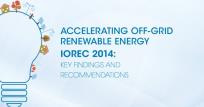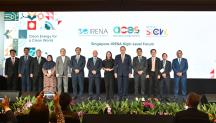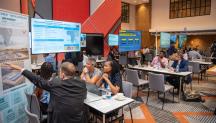

Mini-Grid, Off-Grid Solutions No Longer Second Best
Newsletter
"Mini-grids are not a provisional solution, but rather a financially viable approach to creating sustainable energy systems and increasing energy access throughout the globe." - Ernesto Macías from SFC Energy Partners
On the sidelines of the World Future Energy Summit in Abu Dhabi, roughly 60 participants met with IRENA to discuss technological developments, policies and regulations in the field of mini-grid deployment. The key message that echoed throughout this discussion was that mini grids should not be second best to other options, as often they make more sense.
Within the global scenario of energy solutions, mini-grids have traditionally played a secondary role. Yet, over time – roughly 150 years to date – there have been advancements in models, management techniques and technology. Given the nature of mini-grids, each site brings its own complexity and often requires an entirely different solution from those employed in other host countries. For this reason, the panelists agreed that publishing a set of solutions would provide little support for project developers, but that a list of questions – to be considered before setting up a project – could paint a picture of the possible challenges ahead.
Another necessity to off-grid deployment is community engagement. In Bhutan, for instance, frequent brown-outs in a mini-grid system were curtailed by creating a ‘grid-share system’ enabling community members to know when there was an overload and coordinate with their neighbors to avoid a black out. Such systems are essential to strengthen the credibility of renewable energy projects, as failure in one occasion risks reduced engagement in future projects.
The credibility of mini-grid projects could also be threatened by another issue, which needs to be addressed urgently: uncertainty regarding main grid expansion. This perception that mini-grids are temporary, spells risk for investors.To make these projects attractive, developers must determine whether a grid expansion is likely and come up with contingency plans.
Overall, it is clear that mini-grids could offer unique solutions and accelerate progress in rural electrification, but to achieve this operators will have to think outside of the box and make it clear to the energy community that this technology is here to stay.
To support off-grid development, IRENA recently published a new report highlighting key findings and recommendations of the Second International Off-grid Renewable Energy Conference in 2014. The report finds that financing for off-grid development needs to be more accessible and better administered; comprehensive data is needed on technology costs, socio-economic impacts, resource availability and other factors in order to guide effective decision making on scaling up off-grid deployment; capacity building efforts are needed for public agencies, financing institutions, entrepreneurs, regulators and others to promote better understanding the peculiarities of the off-grid sector.




